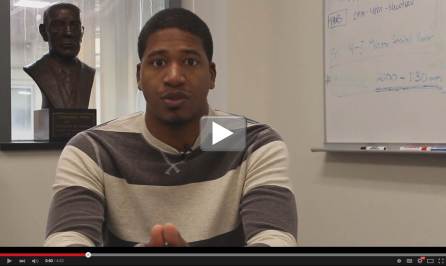LabTV: Curious About Bacteria
 Other than wondering what might be lurking in those leftovers stashed in the back of the fridge, you probably don’t think much about bacteria. But Robert Morton III—a PhD candidate at Indiana University, Bloomington, and the focus of our latest LabTV profile—sure does. He’s fascinated by the complicated and even beautiful ways in which bacteria interact with their environments. In fact, scientists can learn a whole lot about biology by studying bacteria and other single-celled organisms.
Other than wondering what might be lurking in those leftovers stashed in the back of the fridge, you probably don’t think much about bacteria. But Robert Morton III—a PhD candidate at Indiana University, Bloomington, and the focus of our latest LabTV profile—sure does. He’s fascinated by the complicated and even beautiful ways in which bacteria interact with their environments. In fact, scientists can learn a whole lot about biology by studying bacteria and other single-celled organisms.Working in the NIH-funded lab of Yves Brun, Morton has spent many of his days peering through microscopes into the otherwise invisible world of bacteria. His sights are set on the relatively simple, two-component interactions that enable bacteria to sense and respond to various external factors. Each of these interactions features a histidine kinase sensor partnered with a response regulator. Specifically, Morton has focused much of his research on one particular protein thought to play a role in these interactions—a protein that he calls an “orphan” because no scientist has yet identified its partner or determined quite what it does.
The unknown has fascinated Morton ever since he was a child. He was always curious and asked a lot of questions. At school, he found himself drawn to science as a way of understanding and exploring the world around him at a deeper level. He got involved in research as an undergraduate at Binghamton University, Binghamton, NY. After earning his bachelor’s degree, he decided to pursue a PhD in microbiology in Brun’s lab, where researchers are working to answer a variety of fundamental biological questions using bacteria as model systems.
Since sitting down for this LabTV interview, Morton has made progress toward completing his graduate studies. He has finished up his experiments to “de-orphanize” his favorite histidine kinase, and now is working part-time on his dissertation while gaining industry experience as a microbiological lab analyst at Grain Processing Corp., Washington, IN. He has acquired many experimental and intellectual skills, and I look forward to seeing what’s next for this young researcher.
Links:
Yves Brun Lab (Indiana University, Bloomington)
Science Careers (National Institute of General Medical Sciences/NIH)
Careers Blog (Office of Intramural Training/NIH)





















.png)












No hay comentarios:
Publicar un comentario